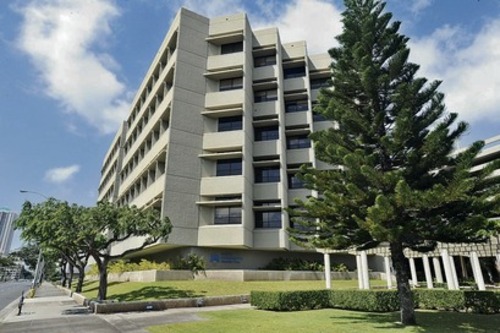Kaiser blames Care Act for $4.3M Q2 loss

2013 FEBRUARY 18 BSN Please get shots of Kaiser Permanente building. SA photo by Craig T. Kojima
Kaiser Permanente Hawaii said Friday it recorded a $4.3 million net loss in the second quarter, reversing a year-ago profit.
The state’s largest health maintenance organization had net income of $1 million in the year-earlier period.
“We all still have work to do in managing expenses while maintaining quality, especially given the challenges we face in today’s health care environment, including higher pharmaceutical costs,” said Thomas Risse, Kaiser’s chief financial officer, in a news release.

The HMO — both an insurer and medical provider — collected $307.9 million in the quarter ended June 30 compared with $295.2 million a year earlier. It spent $312.9 million on operating expenses, up from $294.5 million.
The result was a $5 million operating loss, compared with a $700,000 year-earlier gain.
Don't miss out on what's happening!
Stay in touch with breaking news, as it happens, conveniently in your email inbox. It's FREE!
Investment income, however, boosted earnings by $700,000, up from $300,000 a year ago.
Kaiser said it increased members by nearly 1,700 in the second quarter, bringing total membership to 241,688 as of June 30.
“We recorded reduced revenue of $6.1 million in the second quarter due to the (Affordable Care Act) Risk Adjustment Program,” Risse said. “This is an adjustment based on 2014 membership experience, without which we would have been just above break even.”
The company has been embroiled in a dispute with the union representing 1,900 Kaiser employees after three years of stalled contract talks.
Unite Here Local 5, representing 1,900 Kaiser employees including licensed practical nurses, medical assistants and housekeepers, said it didn’t make headway in negotiations with Kaiser since resuming bargaining in April, and staged a rally last month at the Honolulu Clinic.
In February the union organized a six-day strike — the first statewide strike for Local 5 Kaiser members since 1986 — following objections to what it called low proposed wage increases and a proposal to eliminate guaranteed pensions for new employees, a sticking point in the collective bargaining.
The HMO closed 10 of its smaller clinics on Oahu and the neighbor islands during the strike and rescheduled elective procedures and nonurgent appointments while consolidating resources to its larger medical facilities.



